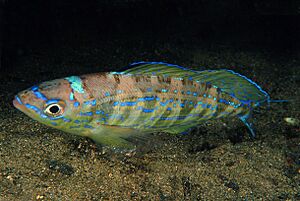Spicara smaris facts for kids
Quick facts for kids Spicara smaris |
|
|---|---|
 |
|
| Conservation status | |
| Scientific classification |
|
| Kingdom: | Animalia |
| Phylum: | Chordata |
| Class: | Actinopterygii |
| Order: | Perciformes |
| Family: | Sparidae |
| Genus: | Spicara |
| Species: |
S. smaris
|
| Binomial name | |
| Spicara smaris (Linnaeus, 1758)
|
|
| Script error: The function "autoWithCaption" does not exist. | |
| Synonyms | |
|
|
Script error: No such module "Check for conflicting parameters".
The Picarel (Spicara smaris) is a type of fish with fins that look like rays. It belongs to the seabream and porgy family, called Sparidae. You can find this fish in the eastern Atlantic Ocean, the Mediterranean Sea, and the Black Sea. Picarels can grow up to about 20 centimeters long. Female picarels are usually a bit smaller than the males.
Contents
About the Picarel's Name
The scientific name for this fish is Spicara smaris. It was first officially described in 1758 by a famous scientist named Carl Linnaeus. He called it Sparus smaris back then.
The name Spicara comes from an old word for picarels, especially a type found in Italy. It might mean "spike" or "spiky," but why it was chosen isn't fully clear. The second part of the name, smaris, is an ancient Greek word for this specific fish. People have been using this name since at least the time of the famous thinker Aristotle.
What Does a Picarel Look Like?
Picarels can grow up to 20 centimeters long, but they are more commonly around 15 centimeters. They are quite slender fish. You can tell them apart from a similar fish, the blotched picarel, by counting the scales along their side. Picarels have 75 to 81 scales, while the blotched picarel has fewer.
The back of a picarel is grey-brown. Its sides are shiny and silver. It has a big black spot right above its pectoral fin, which is the fin on its side. Male picarels are usually bigger than females. They also have small blue spots on their top and bottom fins, which makes them look quite striking.
Where Do Picarels Live?
Picarels are found in the warmer parts of the eastern Atlantic Ocean. This includes the coasts of Portugal, the Canary Islands, and Morocco. They also live in the Mediterranean Sea and the Black Sea.
These fish usually hang out in areas with seagrass meadows. They also like sandy or muddy parts of the seabed. You can typically find them at depths between 15 and 170 meters. However, some have been seen as deep as 328 meters in the eastern Ionian Sea.
Picarel Life Cycle and Habits
Picarels are very social fish. They like to swim together in large groups. This helps them stay safe and find food.
An interesting fact about picarels is how they change gender. They are what we call "sequential hermaphrodites." This means that all picarels start their lives as females. As they get older, some of them change and become males. All picarels that are bigger than about 17.9 centimeters are males. Males can live up to six years, while females usually live up to four years.
Picarels breed once a year. During breeding season, the male fish become much brighter in color. The male will dig a nest in the soft sand or mud. The female then lays her eggs in this nest. The male picarel is a good dad! He guards the eggs until they hatch. After the baby fish hatch, the male's bright colors fade, and he goes back to swimming with the other fish in his group.
Picarels as Food
Picarels are a popular food in some parts of the world. People enjoy eating them in southern Italy, Dalmatia (a region in Croatia), and Greece. In Dalmatia, salted picarel, called slana gira, is a favorite dish.
In Cyprus, picarel is one of the top five most commonly caught fish. In Greece and Cyprus, picarel is often called marida. It's usually covered in batter and fried. People often eat the whole fish, including its head, tail, and bones!
 | Jackie Robinson |
 | Jack Johnson |
 | Althea Gibson |
 | Arthur Ashe |
 | Muhammad Ali |


